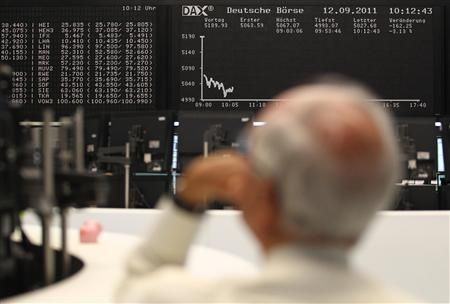UK, European Stocks Deliver Worst Quarter in 9 Years

European and British stock markets have suffered their worst quarterly performances since 2002, as fears of a crippling Eurozone debt crisis and risks of another global recession have battered equities in Britain, Germany and France.
For the quarter, Britain’s FTSE-100 index dropped 13.7 percent; Germany’s DAX plunged 25.4 percent and France’s CAC-40 tumbled 25.1 percent.
Germany, which outperformed other European markets in the first half of the year, suffered a ghastly drop in the third quarter – its worst since the third quarter of 2002. The CAC’s plunge was also its poorest showing in nine years – the French bank Societe Generale dropped an astounding 51 percent, the largest quarterly loss for the bank in history.
Although Britain’s FTSE outperformed its French and German peers, it nonetheless posted its worst performance since 2002, and the fourth worst in its history.
Reuters reported that the sell-off wiped out an astonishing $1.2-trillion in European market values.
The DAX and CAC are currently trading at forward P/E’s of 8.0 and 7.7, respectively; while the FTSE carries an 8.8 valuation (compared with a figure of 10.9 for the S&P 500 index).
While shares in Europe and UK may be relatively cheap, they are likely to remain that way until financial authorities can make any headway in preventing Greece from a debt default that could have devastating consequences for the rest of Europe. Worries are high that Spain and Italy, whose economies are much larger than that of Greece.
Karen Olney, head of European thematic strategy at UBS, told Reuters: "Politicians tend to react better when the markets are falling than rising. If we don't get a solution imminently, we could have another leg down.”
She added: "In a rising market, they are not going to come up with a grand slam plan. If the markets are suffering again, they may be pushed to come up with a solution that we need. This is why some people consider Europe difficult to invest in, almost uninvestable at the moment."
Similarly, Ronan Carr, European equity strategist at Morgan Stanley, told the media: "You don't get a sustainable rally until either the growth outlook improves or you get substantial progress on the sovereign debt crisis. In the absence of either of those things, investors should remain cautious and defensive positioned.”
Indeed, the outlook in Europe is quite grim.
David Mackie, an economist at JP Morgan, said he thinks the Eurozone will sink into a recession in the fourth quarter of this year that would last through next summer.
“At first blush, the recession that we look to be sliding into now looks more like the 2008/09 experience,” he said.
“Instead of a monetary policy shock, the region is experiencing a confidence shock – confidence in sovereign solvency – which is being amplified by a still vulnerable financial system.”
© Copyright IBTimes 2024. All rights reserved.





















